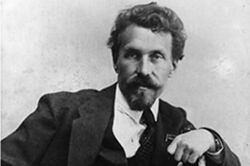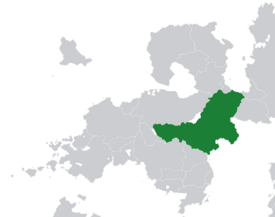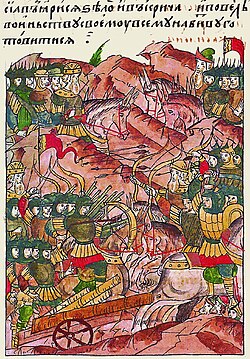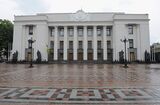Luepola: Difference between revisions
No edit summary |
|||
| Line 12: | Line 12: | ||
|symbol_type = Coat of Arms | |symbol_type = Coat of Arms | ||
|national_motto = "Po pravam ili silam"<br><small>"By right or might"</small> | |national_motto = "Po pravam ili silam"<br><small>"By right or might"</small> | ||
|national_anthem = ''[https://www.youtube.com/watch?v=EetexNwaN7E Marš Lémanki]<br><small>March of | |national_anthem = ''[https://www.youtube.com/watch?v=EetexNwaN7E Marš Lémanki]<br><small>[[March of the Lémanites]]</small>'' | ||
|royal_anthem = | |royal_anthem = | ||
|image_map = {{Photomontage | |image_map = {{Photomontage | ||
Revision as of 00:24, 28 March 2020
This article is incomplete because it is pending further input from participants, or it is a work-in-progress by one author. Please comment on this article's talk page to share your input, comments and questions. Note: To contribute to this article, you may need to seek help from the author(s) of this page. |
Republic of Luepola Respublika Ľupolska | |
|---|---|
| Motto: "Po pravam ili silam" "By right or might" | |
| Anthem: Marš Lémanki March of the Lémanites | |
Location of Luepola | |
| Capital | Prishek |
| Largest city | Voitz |
| Official languages | Luepolan |
| Recognised regional languages | |
| Ethnic groups (2018) | Luepolan Molves 82% Non-Luepolan Molves 12% Njataris 3% Vierz 2% Other 1% |
| Religion | Orthodoxy |
| Demonym(s) | Luepolan |
| Government | Federal semi-presidential republic |
• President | Savo Grigorević |
• Vice President | Anastasi Obrádović |
• Prime Minister | Radovan Kozić |
| Legislature | Luepolan Assembly Ľupolski Sbor |
| Sliet | |
| Great Assembly of Luepola Veliki Sbor Ľupoloj | |
| Establishment | |
• Unification of Varadna and Strentland | 4 August 1329 |
• Declaration of the Kingdom of Luepola | 10 July 1390 |
| 13 March 1979 | |
| 8 July 1985 | |
| Area | |
• Total | 821,700 km2 (317,300 sq mi) |
| Population | |
• 2019 estimate | 79,406,594 |
• Density | 96.6/km2 (250.2/sq mi) |
| GDP (PPP) | 2019 estimate |
• Total | $2,185,348,873,474 (2.1 trillion) |
• Per capita | $27,521 |
| GDP (nominal) | 2019 estimate |
• Total | $1,798,559,354,100 (1.8 trillion) |
• Per capita | $22,650 |
| Gini | 29.1 low |
| HDI | 0.845 very high |
| Currency | Luepolan Grivna (Ғ) (LG) |
| Time zone | UTC+2 |
| Date format | dd.mm.yyyy |
| Driving side | right |
| Calling code | +52 |
| Internet TLD | .lu |
Luepola, officially the Republic of Luepola (Luepolan: Respublika Ľupolska), is a federal parliamentary republic located in eastern Patyria. It is divided into thirteen voblasts (states), two federal municipalities, and one disputed Special Administrative Zone. Luepola covers a total of 821,700 square kilometers, making it the largest nation in Patyria, and has a population of 79,406,594, making it the second most populous nation in Patyria after Vierzland. Luepola's capital is Prishek, and its largest city is Voitz. Other notable Luepolan cities include Rostva, Pomorna, Hrdovna, Zvin, Grast, and Utrna.
Luepola is bordered to the north by Vyzinia, Plosenia, and the Gulf of St. Jan; to the east by Tanavia, Vorochia, and the Oriental Sea; to the south by Zacotia and Granzery; and to the west by Lairea and Vierzland.
History
Prehistory
Pre-Unification (until 1329)
Varadna-Strentland and the founding of Luepola (1329-1390)
The Kingdom of Luepola, then known as Varadna-Strentland, was established in 1329 by Genadi I of Strentland. Genadi's wife Vladislava I was the heir apparent to the throne of Varadna; upon her coronation, their son became the heir to both thrones, and Vladislava opted to instead cede control of Varadna to Genadi, unifying the two countries ahead of schedule.
A period of turmoil followed, as the newly unified country was torn into civil war by the two separate houses of nobility backing different successors following the death of Genadi the Lesser. Princess Cvieta I, the preferred heir by the Varadian nobility, emerged victorious from the war. Shortly after the end of the war, neighboring kingdoms Plosenia and Zacotia invaded Varadna-Strentland, initiating the Containment Wars, in which Varadna-Strentland allied Vyzinia to retake its territory and eventually partition Plosenia and annex significant parts of Zacotia. The victory was followed by the declaration of the Kingdom of Luepola as the successor to Varadna-Strentland.
Kingdom of Luepola (1390-1818)
First Luepolan Republic (1818-1901)
People's Republic of Luepola (1901-1948)

The People's Republic of Luepola was officially declared by Lev Gincburg after likely illegitimately winning his re-election as the President of Luepola. The declaration was followed by the relatively quick and violent transformation of Luepola into a one-party socialist state. The Communist Party used its stranglehold over the country to eliminate political opponents and dissidents, hasten Luepola's relatively slow industrialization, reform the Luepolan language and script, and export its ideology to other nations. Countries such as Vorochia, Granzery, Poicary and Apelia fell sway to communism throughout the first half of the 20th century. Luepola transformed its colonial holdings in Oridia and Tusola into socialist republics, but effectively maintained a stranglehold on their state affairs.
Luepola's decision to forcibly expand socialism to Tanavia led to Vierzland and Savland's declaration of war against Luepola as it prepared to invade Zacotia. This marked the beginning of the Great War, which saw Luepola and its communist allies enter the war against the Allied Powers, which grew to include Tierada, Vonzumier, and Zaihan. The sole remaining member of the Socialist International Coalition as of summer 1948, Luepola finally capitulated upon the death of its secretary Anton Marusić, and the People's Republic was dissolved shortly thereafter. Luepola's satellite republics in Oridia were placed under Vierz administration, and Luepola itself placed under military occupation.
Vierz Occupation and the State of Luepola (1948-1976)
Luepolan War (1979-1985)
Second Republic of Luepola (1985-Present)
Geography
Luepola is a relatively large country, covering 821,700 square kilometers and securing its position as the largest country in Patyria, followed by neighboring Vierzland. Luepola has a largely temperate climate overall, though the southern coastal regions of the country receive quite warm temperatures, and the mountainous western and northern stretches of the country experiencing a cold, alpine climate for much of the year.
Demographics
| Largest cities of Luepola (2019 census) | |||||||||
|---|---|---|---|---|---|---|---|---|---|
| City | Population | State | City | Population | State | ||||
| 1 | Voitz | 2,364,964 | Občina Vojc | 11 | Bráznica | 595,788 | Aneska | ||
| 2 | Rostva | 1,512,376 | Jutska | 12 | Elenevo | 581,393 | Jutska | ||
| 3 | Prishek | 948,083 | Hautbecirk | 13 | Čakajec | 560,848 | Bružka | ||
| 4 | Zvin | 713,555 | Varadna | 14 | Aneska | 557,854 | Aneska | ||
| 5 | Grast | 704,721 | Trnava | 15 | Voľana | 547,967 | Varadna | ||
| 6 | Kořevac | 687,397 | Trnava | 16 | Nediňe | 539,901 | Bosunija | ||
| 7 | Bosaňe | 664,919 | Dvolăn | 17 | Mlaževo | 500,608 | Varadna | ||
| 8 | Hrdovna | 655,083 | Sevierna | 18 | Đalan | 488,226 | Nimorăn | ||
| 9 | Utrna | 644,323 | Bosunija | 19 | Judusa | 472,475 | Bosunija | ||
| 10 | Pomorna | 638,575 | Jutska | 20 | Obránse | 470,273 | Cărnipoře | ||
Ethnic Groups
Religion
Christianity is the dominant religion in Luepola, encompassing 77% of the population. Of this, 14% professed to be Catholics, whereas the other 86% professed to be Orthodox.
Approximately 15% of Luepolans claim to be Atheist or Agnostic, or otherwise irreligious.
About 4% of Luepolans profess Islam as their religion. Of these, 80% claim to be Sunni Muslims, with Shi'ites and Sufis encompassing the remaining 20%
3% of Luepolans claim to be followers of another religion. Noteworthy religions in this category include Judaism, Hinduism, and Buddhism.
Government

The Luepolan government consists of three branches: the Luepolan Assembly, which is the legislative body of the government; the Executive branch, which is composed of the President, Vice President, cabinet, and most government agencies; and the Luepolan National Court, which is the highest judiciary body in the nation.
The Luepolan Assembly (Luepolan: Ľupolski Sbor) is a bicameral legislature which consists of two houses. The Sliet consists of four representatives from each state, who are voted into office by the representatives of the Lower House. The Lower House, officially known as the High Assembly of Luepola (Luepolan: Veliki Sbor Ľupoloj) consists of over two hundred representatives that represent the states based on population, and whose representatives are voted into office through public elections. Representatives in both houses serve four-year terms and are restricted to three-term limits. The legislative body has the collective power to propose and pass legislature, to permit or deny peace treaties, and to declare war on another nation. The senate also has the power to override a presidential veto on a piece of legislature, provided a 2/3 majority is reached. If a 3/4 majority is present in the original vote, the vote pre-emptively overrides a possible veto from the president. The senate also has the power to decide if a president is to be impeached, and to approve of a presidential nomination to the High Court. The leader of the Sliet's majority, whether a coalition or single party, is appointed as the Prime Minister of Luepola.
The Executive Branch consists of the President, who is elected by popular vote in a runoff election. The President is the Head of State of the nation. The President appoints personal advisors to his cabinet, who function as the heads of the various government agencies. The President is the ceremonial Commander-in-Chief of the Armed Forces. The President is also responsible for signing bills passed in the Assembly, or vetoing them. The President also appoints judges to the High Court, though they must be approved by the Assembly. The President can serve up to three four-year terms, though all presidents elected since 1985 have served for two terms at most.
The High Court is the supreme judiciary body of the nation, and handles cases that have been appealed past all regional courts. The High Court also determines whether a bill is permissible according to the Luepolan Constitution, and is in charge of handling impeachment cases. Judges are appointed by the President and approved by the Assembly, and may serve for a maximum of thirty years, though these terms may be cut short by voluntary retirement or death. A judge cannot be legally removed from his position except by his own retirement or by term expiration.
Savo Grigorević, the incumbent president of Luepola.










